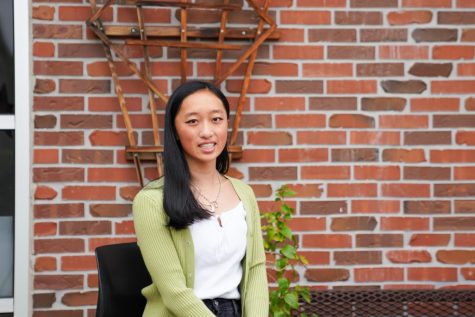A new language, a new world
Examining initiatives in place at MVHS to help English Language Learners
Examining initiatives in place at MVHS to help English Language learners
April 14, 2023
Freshman Subin Ko moved from Korea to Cupertino in December of 2022. After taking an English placement exam, he was classified as an English Language Learner and enrolled in English Language Development 2, Sheltered Literature and Writing and Sheltered Biology at MVHS.
“I think the hardest part is the language because they are all using English but I don’t know many words because I am still [learning] English,” Ko said. “So I have difficulty when, for example, we do a project [and] I have to search [up] the [definitions of] words. It takes two times [as long] as other [students].”
In MVHS, 31% of students do not speak English as their native language. Among these, 31 students will be enrolled in ELD 2 or ELD 3 next year. ELD teacher Ellie Brown has been altering her curriculum to address this achievement gap based on feedback and discussion with other ELD teachers.
MVHS offers ELD 2 and ELD 3, which follow a curriculum Brown and other ELD teachers from around the district curate when they meet each semester. Students usually pair their ELD course with sheltered classes — structured classes that focus around a specific subject such as history or biology, but are taught at a slower pace and with appropriate supports such as scaffolds that help students learn the same materials as a student in a general class — as a part of their core studies. For the 2023-24 school year, 14 students enrolled in Biology Sheltered and 24 students enrolled in Literature and Writing Sheltered, which are two of the 11 sheltered courses offered at MVHS.
“Sheltered classes really help me to be really, really comfortable and adapt to this environment of the city,” Ko said.
Most of these sheltered classes correspond to the freshman and sophomore year curriculum since they are usually taken in tandem with the two ELD classes, and students typically move up to general classes and leave ELD in their junior and senior year.
Brown has seen her ELD students face struggles ranging from trying to adapt to English to adjusting to living in a new country. One pressing challenge for Brown is ensuring that her students are receiving the necessary support they need in all their classes to succeed, as they have to learn new subjects while both juggling a new language and dealing with MVHS’s competitive academic environment.
Senior Nicole Ni, who moved to the United States from Hong Kong in seventh grade, moved out of sheltered and ELD classes during her third year of high school.
“If [ELD students] want to be academically more competitive, they have to work a lot harder to study English and also writing,” Ni said. It was a little bit challenging for me [to transition out of ELD]. Teachers give lectures at a different pace so it was hard for me to adjust to AP programs.”
Brown has been working to remedy the achievement gap by working with other ELD teachers as well as future teachers of ELL students. For instance, teachers are notified when their student is classified as an ELL but has moved out of ELD. Brown believes that teachers who teach former ELD students can accommodate them by implementing scaffolds such as sentence frames to help them “kickstart their ideas so they can better access the content or express themselves clearly” and front-load materials such as difficult but essential vocabulary to give them more time to prepare.
Junior Lemon Liu believes that not only teachers but also students play an important role in supporting ELD students, as while teachers can provide academic support, other students can provide empathy. Although Liu was never an ELD student at MVHS, her experience moving to the United States in middle school allowed her to empathize with current ELD students.
When she joined the Interdisciplinary Research and Project Design elective at MVHS, Liu decided to host a pre-course selection event for ELD students to help them adjust to MVHS’s academic environment after ELD and sheltered classes. During this event, Liu went over different course pathways ELD students can take, provided resources for time management and invited seniors who already went through the ELD program to give advice.
“I think it was really well received considering that a lot more people showed up than I expected,” Liu said. “I was pretty happy that even after the event, people reached out to me on Instagram to personally thank me [about] how helpful it was for them.”
Apart from academics, both Ni and Ko mentioned that one of the most significant challenges they faced was adapting to the new social environment and making friends with English native speakers.
“In the first two years [of high school], 90% of my friends were also kids who didn’t speak English,” Ni said. “I didn’t really have the nerve to talk to [English] native speakers because we [were] not in the same classes. My friends and I realized that a lot of us don’t really have a broad social sphere, which means that our socializing with other students was limited.”
In order to create a community for international students, Ni and her friends revived the Global Friendship Club in the beginning of the 2022-23 school year, after the club’s disbandment during the COVID-19 pandemic. In GFC, students such as Ko have the opportunity to socialize, discuss current events and watch presentations on how to excel academically.
“When you don’t speak a language and when you don’t know some people, it’s really hard to focus on anything,” Ni said. “[I hope] this club gives more exposure to [ELD students], a minority of [the school], and also to have our school to be more united.”
Expanding on the community formed through GFC, Brown describes the overall ELD community as very close-knit and resilient.
“I feel like my ELD students in general really band together and they have a close sense of community in my ELD classes,” Brown said. “I also know that my students want to move through ELD, because moving out of ELD means that they have successfully mastered some more English, and I see that determination not only in my ELD class, but I think in their other classes as well. They want to do well.”


















